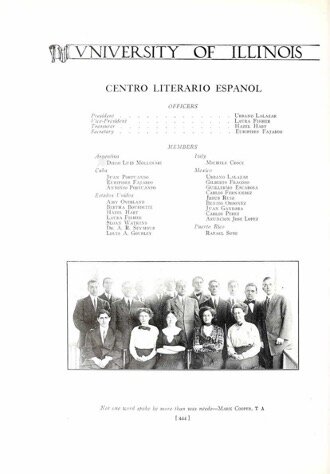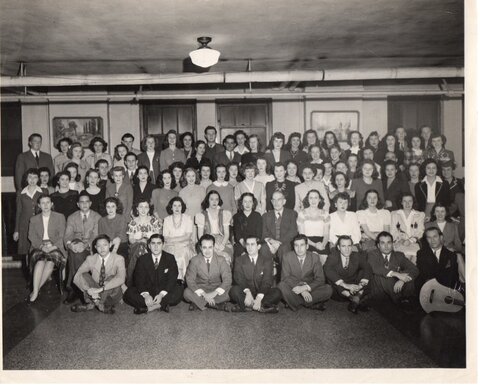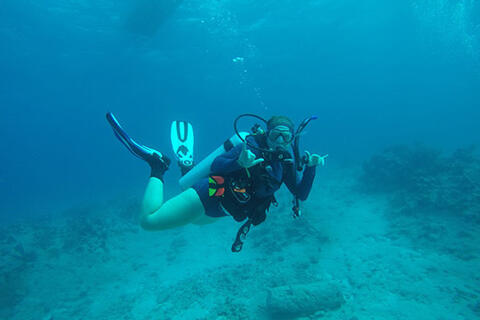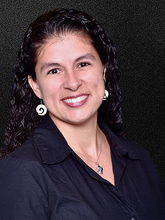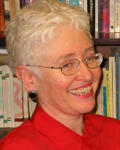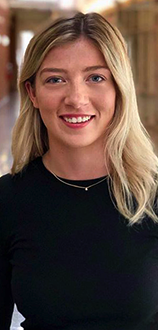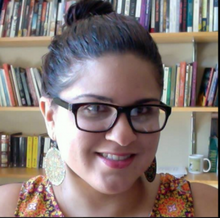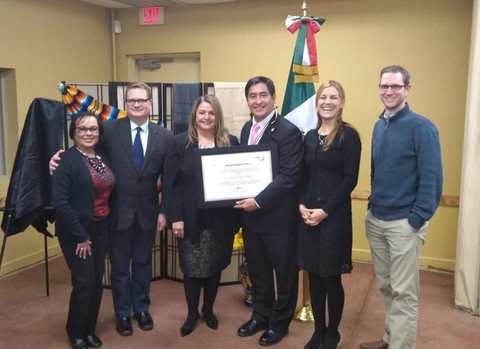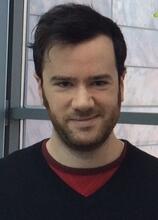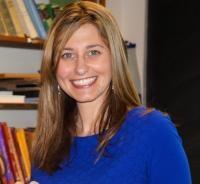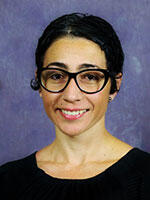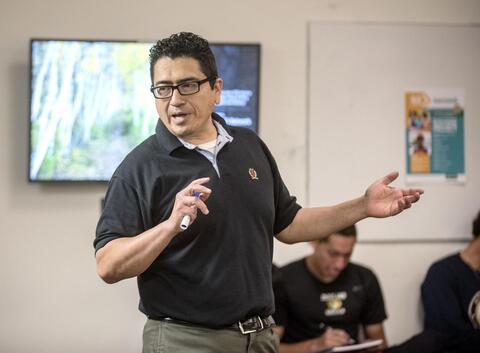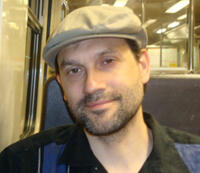One hundred twenty-nine years of Spanish at the University of Illinois
By Professor Mariselle Meléndez
In the midst of a pandemic, reflecting about the past offers us an opportunity to travel back in time and learn how academic institutions have subsisted throughout historical challenges and unexpected crises. As a Head of the department, and also as a researcher of the distant past, I embarked on the fascinating task of digging into the history of my own department to learn about the many changes that my unit has gone through in its efforts to educate students, produce innovative research and teaching, and engage with the community. Spanish at the University of Illinois, Urbana-Champaign (UIUC), has a one hundred twenty-nine-year history, which would be difficult to sum up here. However, I invite you to learn about its beginnings. You will see that in spite of all the historical changes that we have witnessed, a sustained commitment to foster creative knowledge to better educate our students and future leaders has been a trademark from its inception.
Our university began to offer Spanish courses in 1891 under what was known as the School of English and Modern Languages. Spanish was taught in alternate years taking turns with Italian. In 1893, Spanish became part of what was named that year the Department of the Romance Languages and Literature. The first course was offered by Rev. Misael Rama Paradis and it consisted of selected readings, composition, and conversational exercises. This marked the beginning of an increased interest in the study of Spanish at UIUC which extended to classes on “Grammar and Reading” as well as “Cervantes’ Don Quijote.” By 1908 the offerings extended to “Conversation and Composition,” “Advanced Readings and Compositions” which was taught with an emphasis on Spanish drama and poetry, and also a course on “Phonetics and Syntax.” Arthur R. Seymour who had a M.L. was listed as the instructor of record for the majority of these courses.
In 1908 as Spanish courses increased, the Centro Literario Español was created. The club was a type of tertulia composed of Latin American students and students from Argentina, Cuba, Italy, Mexico, Puerto Rico and the United States who met twice a month. The proceedings of the club were conducted in Spanish and it offered “a meeting ground for native and foreign students to exchange information concerning the commerce and literature of their respective countries.”[1] It is interesting to note the inclusiveness and interdisciplinary interests that characterized this group not only in terms of ethnicity but also in gender as the above photo shows.
Spanish remained as part of the Romance languages major and minor until 1919. Aside from the club Centro Literario Español, the focus on Latin America or courses on this area were practically absent in the first twenty years of the history of Spanish at UIUC. The Spanish program was basically in the hands of two main professors up to 1929 who were, Dr. Arthur R. Seymour and Assistant Professor John Driscoll Fitzgerald. In the case of Fitzgerald, he taught at UIUC from 1909 to 1929. He was a distinguished member of the Hispanic Society of America and a corresponding member of the Real Academia Española. Seymour was instrumental in the creation of Spanish courses with a heavy emphasis on business including “Spanish for Business” and “Business Correspondence and Conversation.” Materials analyzed in these courses ranged from facsimile business correspondence to consular and governmental documents written in Spanish. To these, Spanish graduate courses were added in 1917 which included “The Novela of the Golden Age” and “The Modern Novel in Spain.” Prof. Fitzgerald and Dr. Seymour were respectively in charge of those courses.
In 1919-1920, Spanish was recognized as a major requiring completion of 20 hours of Spanish in addition of Spanish elementary courses. As the program grew, and Dr. Seymour became Assistant Dean of Foreign Students, Spanish was taught by then Associate Professor Dr. John Van Horne, one instructor with a PhD and fourteen Assistants, seven of them women. All fourteen Assistants held A.B. B.S. and A.M. degrees. In fact, Professor Van Horne –a twice awarded John Simon Guggenheim fellow- eventually became Head of the Department. It is after Spanish became a major when the first two Latin American courses focusing on Mexican culture and literatures were offered in 1929-1930; one on “El pensamiento y la cultura mexicana revelado en su literatura” and another one on “La novela en la literatura mexicana”. Both courses were taught by Visiting Spanish Professor and writer Julio Jiménez Rueda. Jiménez Rueda was a Mexican lawyer, playwright and diplomat who was also known for being the co-founder of the now famous Instituto Internacional de Literatura Iberoamericana. This emphasis on the intersections between literature and culture would become, since then, a signature of what our department is known for today.
In 1939-1940, The Dean of the College of Liberal Arts and Sciences recommended that the Department of Romance Languages be reorganized into two departments, namely: (1) The Department of French, and (2) the Department of Spanish and Italian; each to have a separate head, staff and budget. Professor Van Horne was named Head of the Department and the departmental office was located in Lincoln Hall. At that time the Department already offered a minor with 20 required hours. In the 1940s, the number of Latin American courses increased including “Introduction to Spanish American Literature”, “Modern Spanish and Spanish American Drama,” “Survey of Latin American literatures”, “Orígenes de la cultura hispanoamericana”, and “Grandes escritores de la América hispana en los siglos XIX-XX.” At the time illustrious visiting professors came to the University of Illinois to teach, including famous Uruguayan scholar Enrique Rodríguez Fabregat and José Bagú. Enrique Rodríguez Fabregat, world renown journalist and politician, eventually became a diplomat at the United Nations playing a vital role along with Gabriela Mistral on the “Tabla de los Derechos de la Niñez” which became the foundational document for the creation of the UNICEF. Bagú was an internationally known Argentinean historian, philosopher and sociologist who is considered to date one of the most influential Marxist thinkers. While on campus he gave many talks on issues from post war problems in Pan America to student relations between the US and South America. The courses on Latin America were also taught by Joseph S. Flores who was an Assistant at the time. Flores taught for forty-one years in our department and in his honor the Joseph S. Flores award was established by his former students and colleagues at Illinois and across the nation to honor him for his achievements. Our department gives the award annually to an outstanding undergraduate majoring in Spanish.
In the early 1940’s Spanish played an important role in community outreach. Mary Kranos Rubio, who was a graduate student in Spanish in 1943 and who in 1944 also worked as a part-time secretary to the head, donated visual memorabilia to the department about these decades which coincided with World War II. Thanks to these materials we know more about this historical moment. According to her, the department at the time played a key role in the training of enlisted soldiers. Her archival records state that, “During World War II, the department was assigned a group of enlisted men for special oral training in Spanish. The department was supplied a 78-rpm phonograph recording machine and 7-inch discs, acetate coated on glass, marked ‘Howard’ and ‘Silvertone’(https://spanport.illinois.edu/alumni/historical-photos/mary-kranos-rubio-memorabilia-archive-1939-1944). This engagement with the community was followed by an important curriculum innovation when in 1949 the College of Liberal Arts and Sciences (LAS) established a major in Latin American Studies, becoming the university’s “first major to study a world region, marking campus engagement with the international community” (Newsletter, Winter 2014). This departmental engagement with the international community is still present through our study abroad programs in Spain and Latin America, and in our exchange with the Etxepare Basque Institute which offers us the opportunity to still teach Basque language and culture.
It is interesting to note that in the early 1940’s with travel restricted to many countries due to the World War II situation, many international students had to remain here on campus. This is quite similar to what happened to our current students when covid-19 hit in March 2020 when they were unable to return home. According to Mary Kranos Rubio, students from South America remained in Urbana-Champaign and spent some of their time participating in Spanish plays as part of the Spanish Club activities. The number of members was quite high as the photo below shows.
The emphasis on diversifying the department continued in the 1960’s when the Department of Spanish and Italian became in 1961 one of the first departments in the United States to offer a degree of Master of Arts in the Teaching of Spanish which continued until 1999. Also, during the leadership Professor W. H. Shoemaker as Head, the university approved a change in the name of the Department of Spanish and Italian to Department of Spanish, Italian, and Portuguese. The reason for the change was that courses in Portuguese had been offered by the Department of Spanish and Italian for a number of years and the change was to reflect more accurately its program. Under W. H. Shoemaker, one of the most important hires in the history of our Department occurred when Professor Luis Leal was hired. Professor Leal was an internationally recognized scholar of Mexican, Chicano and Latin American literature who is considered as one of the founders of the field of Chicano literary studies. Luis Leal attracted students such as famous alumni Rolando Hinojosa-Smith (Ph.D. ‘69 in Spanish) an award-winning author of short stories, poetry and novels who became a distinguished professor of creative writing and English at the University of Texas. In 1988-89, he was named the University of Illinois/College of Liberal Arts Distinguished Alumnus while later in 1998 the University honored him with the University of Illinois Alumni Achievement Award.
In the 1970’s our Spanish curriculum expanded to offer courses on “Black Experience in Hispanic Literature”, “Bilingualism” “Language History and Dialects”, a course on “Study Abroad” which included lectures, seminars, and practical work in Spanish language, literature and civilization in Spain” and a course on Puerto Rican literature, both at the 300 level. Spanish courses in the 1980’s added new courses with emphasis on translation including “Introduction to Translation” and “Translating and Interpreting for Commercial and International studies” at the 200 level. A course on linguistics was also created: “Introduction to Linguistics. These courses were accompanied with a great variety of courses in the areas of Peninsular and Spanish American literatures and cultures. Major curricular changes also occurred in 1995 when the major emphasized areas such as Spanish composition, literatures and cultures of Spain and Spanish America, and Hispanic Linguistics. A Teacher Education Minor in Spanish was also offered for those students who were seeking to add additional teaching fields to their teaching majors.
The late 1990s and the increase in majors placed our department on the national spot as one the first departments (if not the first) in the nation to implement hybrid courses to the basic language program as a need to accommodate an approximate 250% expected increase in enrollment due to campus-wide foreign language requirement beginning Fall 1999. Under the direction of Prof. Giuli Dussias, the goal was also to deliver most written output online while focusing all in-class instruction on oral input and output activities. Melanie Waters, today our Director of Introductory Spanish, was a member of the faculty team in charge of making the restructuration happen. Brenden Carollo, our current Director of Fourth Semester Spanish, worked as the Director of SPAN 122 at the time.
Multiculturalism, language contact, Spanish entrepreneurship, language acquisition, cultural competency along with literary analysis marked new changes in our program after the 90’s. In 2001, The LAS Newsletter published a very interesting article under the section “Student Life” on the role of the Spanish Department in understanding multicultural issues in the US setting. The article, “Multicultural America: Embracing diversity leads to growth of ‘heritage’ language courses,” underlines the two heritage Spanish courses that the College of LAS offered. One of them taught by grad student Nestor Quiroga. Many changes and initiatives occurred in the early 2000s such that the program Spanish and Illinois was founded by Professors Ann Abbott and Darcy Lear (them an instructor in our department). This program offered Spanish students to conduct internships at organizations that serve Spanish-speaking communities. A legacy of the program is our now very popular course Spanish in the Community lead by Professor Abbot herself. The course represents a continuation of our engagement with the Hispanic population in the community. Later in 2009, the Department implemented a major curriculum change in which cultural and linguistic competence was combined with a particular approach in attaining critical and analytical skills. This was one of the first departments in the US to make culture a crucial content area component along with linguistics and literatures. As the abridge history of Spanish at UIUC shows, already a century ago these connections between cultural, linguistics and literary competence were found fruitful and relevant when learning Spanish and gaining intercultural and linguistic competence.[1] All citations come from the Catalogue and Register, Report of committee on courses of study and faculty for the Illinois Industrial University. Information from the 1970 to the 1980’s was found at the University Archives in Orchard Street. I would like to give special thanks to my former RA, Liz-Moreno-Chuquen (Ph.D. 2019) who assisted me with some of the archival research for this article. Yvette Bandin (University of Illinois) also worked as a RA for the last stage of the project. In addition, I would like to thank our librarian Dr. Antonio Sotomayor, Librarian of Latin American and Caribbean Studies who brought to my attention the existence of these photos. Finally, after the pandemic hit, Dr. William J. Maher, Director and Archivist at the University Archives kindly allowed me to complete the rest of my archival work. He also made possible for me to access documents pertaining to 1970’s and 1980’s. My deepest thanks to him for making this possible under very challenging circumstances.
LAS INSIDER features alumna and marine biologist Abby Knipp!
04/25/20
Despite the challenging times we are currently confronting, there are still some wonderful news to share about our alumni and their achievements.
LAS Insider, an online blog for prospective students which covers the sciences, humanities, and social sciences showcased three of our alumn Abby Knipp a recent graduate who majored in Spanish and also in Earth, Society & Environmental Sustainability (ESES).
You can read about Abby Knipp’s exciting journey as a marine biologist in the Spanish speaking Caribbean in:
Alumni News: Heather Ana Hathaway Miranda named Director of the LAS Alumni Board Association.
04/25/20
Heather Ana Hathaway Miranda, a 1995 Spanish alumna, has been selected as Director of the LAS Alumni Board Association. The Association was founded in 1984 as a member-supported organization who works as ambassadors for the College of LAS. The Association also engages in many activities geared to LAS alumni so they can continue to be involved with their college community and our campus.
Heather has had a distinguished and highly accomplished career since she graduated in 1995. She is now a an award-winning, international speaker, a researcher and an educator who specializes in a range of academic subjects intersecting race, ethnicity, class, gender, and disparity. You can read more about Heather here, https://www.heatherhathawaymiranda.com/#.
Congratulations Heather, we are proud of you!
Distinguished alumna Sandra Cypess recognized by EL PAIS
Sandra M. Cypess, a very distinguished alumna of the Department of Spanish and Portuguese and Professor Emeritus of the University of Maryland, has been recognized in EL PAIS for her lifelong work on the figure of “La Malinche,” as well as the neglected author Elena Garro. Her groundbreaking book “Uncivil Wars: Elena Garro, Octavio Paz and the Battle for Cultural Memory” (U Texas Press) has also been recently translated into Spanish. Congratulations, Sandra!
Read the full story from EL PAIS:
https://elpais.com/cultura/2019/11/13/actualidad/1573663847_261036.html
Alumna Phoebe Lauer receives English Teaching Assistant Fulbright to Spain
One of our department's former double majors and recent alumna, Phoebe Lauer, who majored in Spanish and Psychology, has been awarded a Fulbright grant to work as an English Teaching Assistant Fulbright in the Canary Islands, Spain.
While she was our student, Phoebe attended our Study Abroad Program in Barcelona, Spain. She graduated from Illinois last May 2019. To read the article, please check here:
https://las.illinois.edu/news/2019-06-18/las-young-alumni-and-student-awarded-fulbright-grants
Phoebe's award adds to our strong record of undergraduate student recipients of Fulbright grants. If you know Phoebe, please make sure you extend a warm congratulations.
Alumna Chinyere K. Osuji (BA in Spanish and Sociology 2001) publishes new book
10/07/19
Prof. Osuji, a former major in Spanish and Portuguese who graduated in 2001 and went on to Harvard (MA) and UCLA (PhD), just published Boundaries of Love: Interracial Marriage and the Meaning of Race with NYU Press. The book compares the experiences of black-white couples in Brazil and the United States.
You can find more about the book here:
https://nyupress.org/9781479878611/boundaries-of-love/
Alumna Kristina Medina-Vilariño awarded ACLS Frederick Brukhardt Fellowship
Kristina Medina-Vilariño, our former alumni (P.H.D. 2012) and now an Assistant Professor of Spanish at St. Olaf College, has been awarded the very competitive American Council of Learned Societies (ACLS) Frederick Burkhardt Residential Fellowships for her project, Narratives of Life: A Post-Maria Intervention in Colonial Puerto Rico. The (ACLS) Frederick Burkhardt Residential Fellowships for Recently Tenured Scholars support scholars in the humanities and social sciences in the crucial years immediately following the granting of tenure, and provide potential leaders in their fields with the resources to pursue long-term, unusually ambitious projects. Well done, Kristina!
Alumnus José Miguel Lemus recipient Ohtli Award
We are very proud to announce that our alumnus, Dr. Jose Miguel Lemus (Assistant Professor, Creighton University) has received the Ohtli Award for his indefatigable work building bridges of solidarity between the Mexican community and the states of Nebraska and Iowa. His work toward social justice has been recognized by the consul of Mexico, Guadalupe Sánchez. The award took place during the commemoration of the 108th anniversary of the Mexican Revolution. ¡Enhorabuena José Miguel!
https://www.facebook.com/548447065303632/posts/1183390451809287/
You can read more about the award here.
Alumnus Iker González-Allende awarded Leland and Dorothy Professorship at the University of Nebraska
Our alumnus Prof. Iker González-Allende has been awarded a Leland and Dorothy Olson Professorship at the University of Nebraska. The title, which he will keep for 5 years, is intended to recognize extraordinary academic profiles in different fields (Humanities and Sciences).
Congratulations Iker!
You can find Prof. González-Allende's website here.
Alumna Vanesa Landrus recipient of Achievement and Contribution Award
Congratulations to Dr. Vanesa Landrus for receiving an ACA (Achievement and Contribution Award) for Service! A well-deserved recognition!
https://www.facebook.com/ForeignLanguagesEIU/posts/1534261256649892
Prof. Landrus's website at Easter Illinois University can be found here.
Alumna Pamela Cappas-Toro finalist for national Lynton Award
12/25/17
Alumna Prof. Pamela Cappas-Toro has been named a finalist for the national Lynton Award, sponsored by Brown University, which recognizes "a faculty member who, early in their career before receiving tenure, connects their teaching and research to community service and engagement," for her project on La Plaza Comunitaria Latina at Stetson University.
You can find Prof. Cappas-Toro's faculty webpage here.
Alumnus Charles Larenas, Recipient of Annual Immigrant Welcome Award
Alumnus Prof. Charles Larenas was the recipient of the Distinguished Leadership Service Award at The 4th Annual Immigrant Welcome Awards. For the last 11 yearsProf. Charles Larenas has been directing the Summer Migrant Education Program in Champaign County. Parkland College has been hosting the program for the last 9 years. This summer of 2017 Charles just finished his 22nd year with the Illinois State Migrant Education Program which provides high-quality and comprehensive educational programs for migrant children.
The Immigrant Welcome Awards Selection Committee congratulates this year’s award recipients and thanks them for their dedicated work enriching the lives of those not only living in Champaign-Urbana, but around the world. Well done Prof. Larenas!
Alumnus Antonio del Prado featured by Spanish newspaper El País
Our alumnus Antonio del Prado (BA, MA, Ph.D Spanish at Illinois), now a professor of Spanish at Knox College, has been featured by the Spanish newspaper El País in relation to his on-going research project on the narratives written in French by the descendants of Spanish Republican exiles in France. Congratulations, Toni!
You can find Prof. del Prado's Knox webpage here.
